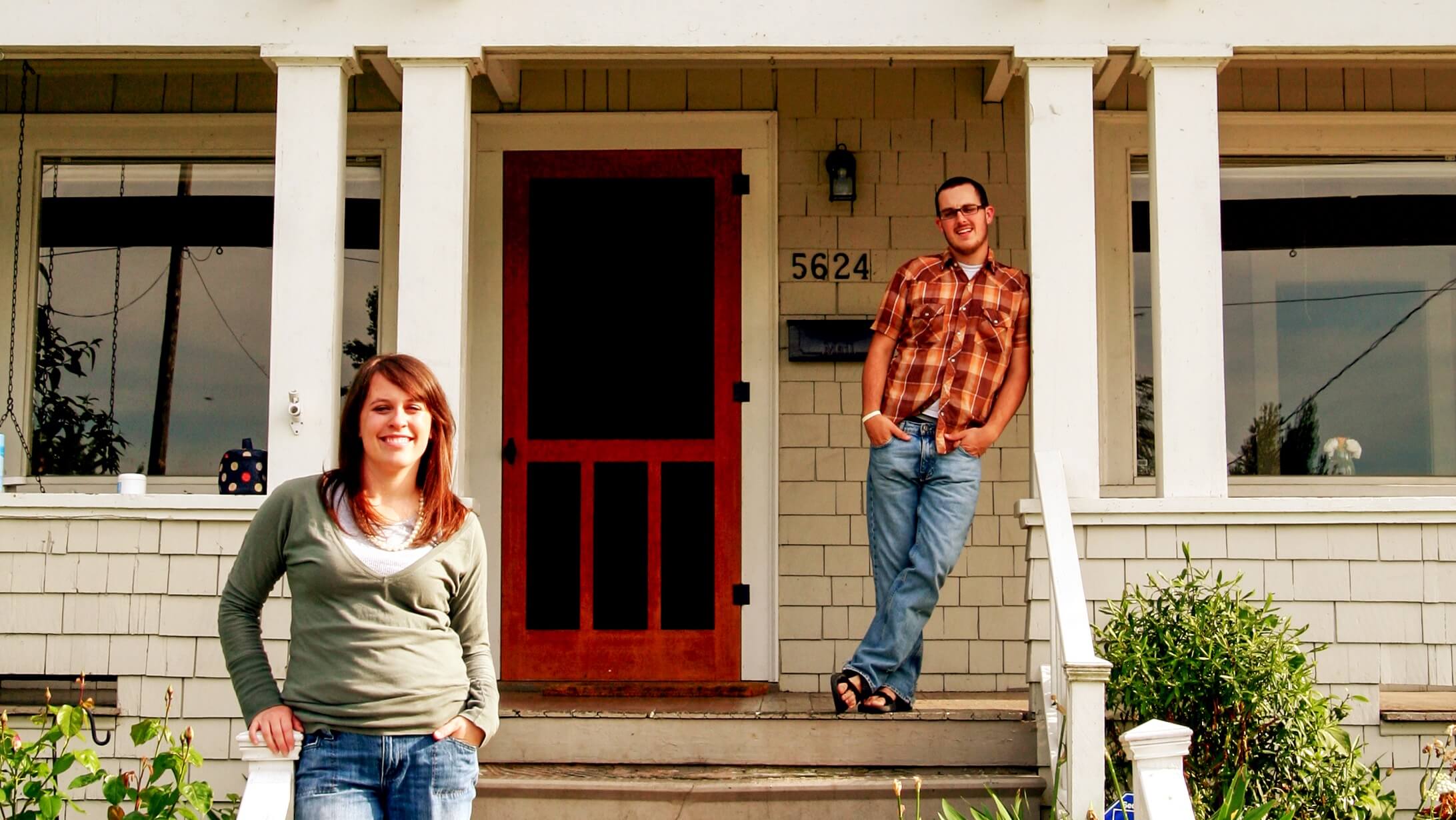Starter home vs. forever home: Which should I buy?

Call to action content
Starter home vs. forever home
When buying their first home, potential homebuyers often have to decide between choosing a starter home and a forever home.
A starter home is a bit less expensive and better for people starting their career or family. The value of it may increase over time, and it provides an opportunity to build equity. It’s not uncommon for homeowners to use equity in their existing property to pay for a down payment or closing costs when their family is ready to grow.
On the other hand, a forever home often requires a larger initial investment. However, they usually come with more amenities and are a place for a family to spread out in.
There really isn’t a ‘one-size-fits-all answer’ when it comes to a starter home versus a forever home. The best choice depends on personal circumstances, including financial situation, career stability, and family needs.
Continue reading to learn more about the differences between a starter home and a forever home. You can also apply for a mortgage pre-approval right now if you’re ready to start the homebuying process.
What’s a starter home?
A starter home is typically the first property that a person or couple will buy. These properties are a good option for first-time buyers and millennials to enter the housing market. They are usually smaller, more affordable, and may need some DIY work to make them your own. They can also be a great investment and a steppingstone towards future property purchases.
Starter homes are not typically forever homes. This is because your needs and financial situation may change as you progress through different stages of life. You may need more space as you start a family or have more income to upgrade to a more desirable location or bigger property. Regardless, the equity you build in your starter home can be crucial when it comes to purchasing your next home.
What’s a Forever home?
The term “forever home” refers to a home that you plan to stay in for the long term – it’s the home where you envision growing old. A forever home is bigger, cozier, and in a location you love. It would typically have all the features and amenities you desire in a home, and possibly some luxuries too.
Forever homes typically cost more than starter homes as they have extra features and are in better neighborhoods. However, the flip side is that they usually offer more stability. You don’t have to worry about moving in a few years or outgrowing the space. You can establish roots in these homes, which are intended to be a long-term investment.
How can I choose the best home option for me?
Deciding on a starter home or forever home relies on your money, future goals, and housing requirements. If you have less money or aren’t ready to live in one place, a starter home could be the best choice. It can give you the experience of homeownership without the commitment of a forever home.
A forever home might be suitable for you if you have a steady income. You should also know where you want to live and be ready for a long-term commitment. It’s important to consider the cost of the mortgage, property taxes, and maintenance costs.
Remember, a bigger house will usually mean bigger bills. It may be helpful to talk with a financial advisor or real estate agent to help you make your decision.
What factors should I consider when applying for a mortgage?
Whether you’re looking for a starter home or a forever home, there are several factors that can affect your overall deal when seeking a mortgage.
First, consider your credit score*, as lenders look at this number to gauge your creditworthiness. A high credit score could help secure a lower interest rate. Make sure to check your credit report for any errors before you apply.
You also need to consider the down payment. The more you put down upfront, the less you’ll have to borrow, and the lower your monthly payments. It’s also important not to use all of your savings for a down payment. It’s important to have some money set aside for emergencies or unexpected home repairs.
How can I save for a down payment?
Saving for a down payment may seem like an overwhelming task. However, with some discipline and a strategic approach, you can reach your goal.
First, create a budget and stick to it, prioritizing savings. Consider opening a separate savings account solely for your down payment fund. This will keep you from dipping into the funds for other expenses.
To save for your down payment, find ways to cut back on unnecessary spending. This can include reducing expenses on eating out or attending events. Instead, use that money to save for your down payment. If possible, consider additional sources of income such as a part-time job or freelance work. Lastly, consider investing your money, which can potentially grow your savings faster over time. However, always consult with a financial advisor before making any significant investment decisions.
What are some affordable housing programs I can consider?
If you’re a first-time home buyer or a millennial looking to break into the real estate market, several affordable housing programs can help. These programs offer incentives like down payment assistance, low-interest mortgage loans, and tax credits.
Remember, each program or type of loan has its eligibility requirements, so make sure you qualify before you apply. Local housing agencies, non-profit organizations, and community development institutions also offer assistance programs. Take advantage of these resources to make homeownership more affordable.
Where can I find affordable properties?
Online real estate marketplaces and apps are great places to start your home search. They give you many options and let you choose properties based on your budget, location, and preferences. Don’t forget to browse home listings in local newspapers or real estate magazines.
Working with a real estate agent can be beneficial. They can provide you with access to multiple listings, offer valuable advice, and guide you through the buying process. Remember to consider properties that may need some work. Fixer-uppers can be an affordable option, especially if you’re handy or willing to learn.
Where can I apply for a mortgage?
Finding an affordable home is possible with careful planning, strategic decision-making, and patience. It’s a journey – one that requires determination and flexibility. Think about all your choices: starter home or forever home, different mortgage deals, affordable housing programs, or fixer-uppers.
Homeownership is a significant financial responsibility, but it’s also an opportunity for stability, independence, and personal growth. Whether you feel a starter home is the right move or a forever home provides the stability you want, Owning can help you.
Apply for a mortgage pre-approval today to start your journey to homeownership. You only need about 10 minutes and a few basic details to complete your application and move towards owning a home.
* Owning IS NOT A CREDIT REPAIR COMPANY, CREDIT REPORTING AGENCY, BROKER OR ADVISOR. You acknowledge that Owning is not a credit repair company or similarly regulated organization under applicable laws, and does not provide credit repair services. Where available, recommendations, tips and education materials are provided to you at no additional charge, and for educational purposes only. The services are intended to provide you with general information and assist you with identifying your options. The information is provided only to enable you to make your own choices about your personal finance, and is not intended to provide, legal, tax or financial advice. We do not provide any services to repair or improve your credit profile or score, nor do we provide any representation that the information we provide will actually repair or improve your profile. Consult the services of a competent professional when you need any type of assistance.
You acknowledge that Owning is not a “consumer reporting agency” as that term is defined in the Fair Credit Reporting Act as amended.
Applicant subject to credit and underwriting approval. Not all applicants will be approved for financing. Receipt of application does not represent an approval for financing or interest rate guarantee. Restrictions may apply, contact Owning for current rates and for more information. All information provided in this publication is for informational and educational purposes only, and in no way is any of the content contained herein to be construed as financial, investment, or legal advice or instruction. Owning, Inc. does not guarantee the quality, accuracy, completeness or timelines of the information in this publication. While efforts are made to verify the information provided, the information should not be assumed to be error free. Some information in the publication may have been provided by third parties and has not necessarily been verified by Owning, Inc. Owning, Inc. its affiliates and subsidiaries do not assume any liability for the information contained herein, be it direct, indirect, consequential, special, or exemplary, or other damages whatsoever and howsoever caused, arising out of or in connection with the use of this publication or in reliance on the information, including any personal or pecuniary loss, whether the action is in contract, tort (including negligence) or other tortious action. Owning does not provide tax advice. Please contact your tax adviser for any tax related questions.

Start your journey home
Getting pre-approved for a mortgage shows sellers and real estate agents that you’re serious and gives you an idea of what you’re likely to get approved for.
Get pre-approved today and begin moving towards owning your first home.